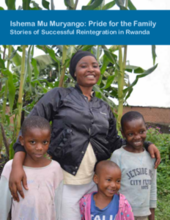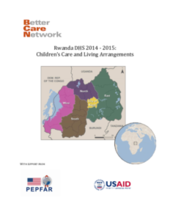This country page features an interactive, icon-based data dashboard providing a national-level overview of the status of children’s care and care reform efforts (a “Country Care Snapshot”), along with a list of resources and organizations in the country.
demographic_data
childrens_living_arrangement
children_living_without_bio
adoption
social_work_force
key_stakeholders
Key Stakeholders
Add New DataOther Relevant Reforms
Add New Datadrivers_of_institutionalisation
Drivers of Institutionaliziation
Add New Datakey_research_and_information
Key Data Sources
Add New DataReport on National Assessment of Centres caring for Children with Disabilities in Rwanda
National Integrated Child Rights Policy
Country Care Review: Rwanda
Prevalence and number of children living in institutional care: global, regional, and country estimates
The Way Forward Project Report
Community-Based Child Protection Mechanisms in Refugee Camps in Rwanda: An Ethnographic Study
Displaying 111 - 120 of 188
Civil society organizations and the National Children's Council (NCC) have appealed for more commitment and support to abandoned babies.
Family for Every Child, in partnership with the Centre for Social Protection at the Institute for Development Studies, just announced the launch of its Cash for Care: Making Social Protection Work for Children’s Care and Well-being Report.
According to the Rwanda National Commission for Children, 2294 out of 3323 have obtained foster families through the "Keeping Children in Families" program.
Rwanda’s "Tubarere Mu Muryango (TMM)," program, which translates to "Let's raise children in families" has placed over 2000 children in foster families.
This report captures what has been accomplished in social service workforce strengthening in eight countries in Sub-Saharan Africa and highlights areas for future intervention. Progress made to strengthen the social service workforce within these countries is useful when reflecting on global trends and ways forward.
The purpose of this assessment was to review service delivery in centres for children with disabilities in Rwanda. This report establishes relevant baseline information on institutional capacity including services offered, staffing levels and other parameters regarding care of children with disabilities.
This article describes how Rwanda successfully reintegrated the children living in orphanages into family care.
This study examined (1) how perceived social support (PSS) varied across orphan‐related characteristics (e.g., orphan status, such as single, maternal or paternal, and their living environments, such as in child‐headed households, on the street, in an orphanage or in a foster home) and (2) the relative importance of sources of PSS (relatives/community/adults and peers) and functional social support (emotional/informational/instrumental and social) and its association with emotional well‐being and mental distress.
This report highlights stories of some children, youth and families who have been assisted under the Ishema Mu Muryango program. While each of their stories is unique, all highlight some common themes about institutionalization and child abandonment in Rwanda.
This country brief is part of a series that aims to provide an analysis of children’s living and care arrangements according to the latest available data from Demographic and Health Surveys (DHS) or Multiple Indicators Cluster Surveys (MICS) at the time of publication.





